之前写过一篇关于MongoDB的封装 发现太过繁琐 于是打算从新写一篇简易版
1:关于MongoDB的安装请自行百度,进行权限认证的时候有一个小坑,3.0之后授权认证方式默认的SCRAM-SHA-1模式,
需要首先命令创建一个用户,然后Drop掉这个用户,然后修改system.version里的authScheam为3,在没有创建用户的情况下
authScheam的值貌似是查询不到的。

修改成3后,授权验证方式就变成了MONGODB-CR
2:建立一个聚合根和实体
public interface ICore { string Id { set; get; } } /// <summary> /// 聚合根 /// </summary> public interface IAggregateRoot { string Id { set; get; } } /// <summary> /// 实体 /// </summary> public abstract class Core : ICore { public string Id { set; get; } = Guid.NewGuid().ToString(); }
3:建立实体
/// <summary> /// 用户 /// </summary> public class User : Core, IAggregateRoot { /// <summary> /// 名字 /// </summary> public string Name { set; get; } /// <summary> /// 身份证 /// </summary> public string Cardcertificate { set; get; } /// <summary> /// 性别 /// </summary> public Gender Gender { set; get; } = Gender.Boy; /// <summary> /// 用户的房屋信息 /// </summary> public List<House> Houses { set; get; } = new List<House>(); } public class House : Core { public string Adress { set; get; } } public enum Gender { Boy = 0, Gril = 1 }
4:建立一个接口Context似于EF的DBContext
public interface IMongoDBContext { /// <summary> /// 具体的表连接器 /// </summary> /// <typeparam name="K"></typeparam> /// <returns></returns> IMongoCollection<K> DbSet<K>() where K : IAggregateRoot; }
添加一个接口的实现
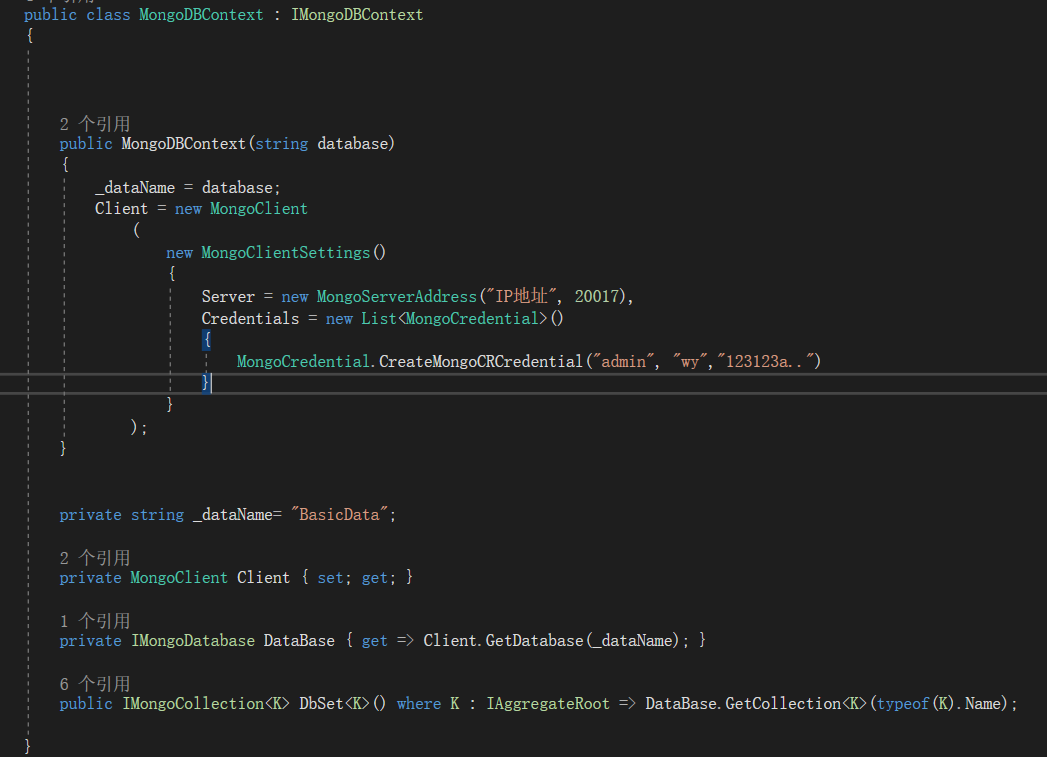
Client 表示的是Mongodb客户端驱动链接 类似于ADO里的SqlConnection
DataBase 表示的是具体的数据库
DbSet 指定具体的表
MongoCredential 认证授权的加密方式
3:建立一个具体的DBContext
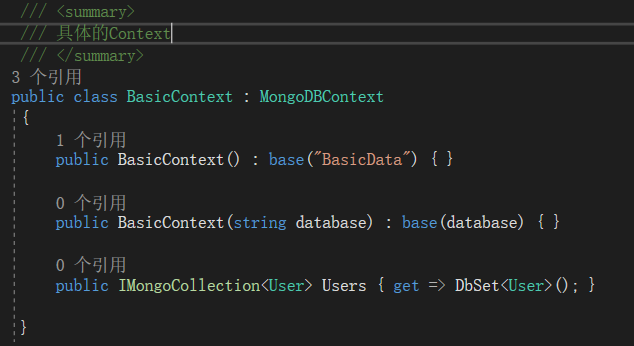
BasicContext 类似于EF里面大家直接链接具体库的DBContext
Users User表的映射
4:建立一个MongoDB访问的扩展类
public static class MongodbExpansion { /// <summary> /// 单个对象添加 /// </summary> /// <typeparam name="T"></typeparam> /// <param name="collection"></param> /// <param name="entity"></param> public static void Add<T>(this IMongoCollection<T> collection, T entity) where T : IAggregateRoot => collection.InsertOne(entity); /// <summary> /// 集合添加 /// </summary> /// <typeparam name="T"></typeparam> /// <param name="collection"></param> /// <param name="entitys"></param> public static void AddRange<T>(this IMongoCollection<T> collection, List<T> entitys) where T : IAggregateRoot => collection.InsertMany(entitys); /// <summary> /// entity mongodb需要更新的实体 properts需要更新的集合属性,大小写不限 默认更新整个对象 replace 默认空属性不修改 /// </summary> /// <typeparam name="T"></typeparam> /// <param name="collection"></param> /// <param name="entity">mongodb需要更新的实体</param> /// <param name="properts">需要更新的集合属性,大小写不限 默认更新整个对象 </param> /// <param name="replace">默认对象属性为空时不替换当前值</param> public static void Update<T>(this IMongoCollection<T> collection, T entity, List<string> properts = null, bool replace = false) where T : IAggregateRoot { if (entity == null) throw new NullReferenceException(); var type = entity.GetType(); ///修改的属性集合 var list = new List<UpdateDefinition<T>>(); foreach (var propert in type.GetProperties()) { if (propert.Name.ToLower() != "id") { if (properts == null || properts.Count < 1 || properts.Any(o => o.ToLower() == propert.Name.ToLower())) { var replaceValue = propert.GetValue(entity); if (replaceValue != null) { list.Add(Builders<T>.Update.Set(propert.Name, replaceValue)); } else if (replace) list.Add(Builders<T>.Update.Set(propert.Name, replaceValue)); } } } #region 有可修改的属性 if (list.Count > 0) { ///合并多个修改//new List<UpdateDefinition<T>>() { Builders<T>.Update.Set("Name", "111") } var builders = Builders<T>.Update.Combine(list); ///执行提交修改 collection.UpdateOne(o => o.Id == entity.Id, builders); } #endregion } /// <summary> /// 移除根据ID /// </summary> /// <typeparam name="T"></typeparam> /// <param name="collection"></param> /// <param name="entity"></param> public static void Remove<T>(this IMongoCollection<T> collection, T entity) where T : IAggregateRoot => collection.DeleteOne(o => o.Id == entity.Id); /// <summary> /// 移除表达式 /// </summary> /// <typeparam name="T"></typeparam> /// <param name="collection"></param> /// <param name="expression"></param> public static void Remove<T>(this IMongoCollection<T> collection, Expression<Func<T, bool>> expression) where T : IAggregateRoot => collection.DeleteOne(expression); public static IFindFluent<T, T> Where<T>(this IMongoCollection<T> collection, Expression<Func<T, bool>> expression) => expression == null ? collection.Find(Builders<T>.Filter.Empty) : collection.Find(expression); /// <summary> /// MongoDB里面是没有实现IQueryable的 所以想要使用习惯的SELECT我们只能自己封装一下 /// </summary> /// <typeparam name="TDocument"></typeparam> /// <typeparam name="TProjection"></typeparam> /// <typeparam name="TNewProjection">返回新的数据类型</typeparam> /// <param name="IQueryable"></param> /// <param name="projection"></param> /// <returns></returns> public static IFindFluent<TDocument, TNewProjection> Select<TDocument, TProjection, TNewProjection>(this IFindFluent<TDocument, TProjection> IQueryable, Expression<Func<TDocument, TNewProjection>> projection) => IQueryable.Project(projection); /// <summary> /// 获得筛选后的首个元素 /// </summary> /// <typeparam name="TDocument"></typeparam> /// <typeparam name="T"></typeparam> /// <param name="IQueryable"></param> /// <returns></returns> public static T FirstOrDefault<TDocument, T>(this IFindFluent<TDocument, T> IQueryable) => IQueryable.First(); /// <summary> /// 直接支持表达式树后的首个满足对象 /// </summary> /// <typeparam name="TDocument"></typeparam> /// <typeparam name="T"></typeparam> /// <param name="collection"></param> /// <param name="expression"></param> /// <returns></returns> public static T FirstOrDefault<TDocument, T>(this IMongoCollection<T> collection, Expression<Func<T, bool>> expression = null) => expression == null ? collection.Find(Builders<T>.Filter.Empty).First() : collection.Find(expression).First(); }
Builders<T>.Update.Combine 方法是将多个UpdateDefinition<T>修改设置合并成一个builder对象执行
IFindFluent 所返回的都是MongoDB执行的命令
MongoDB客户端驱动也是支持异步操作的我这里就没有写了 有兴趣的可以自己研究下
5:建立测试仓储

6:仓储的实现 是不是看起来有点EF的感觉? ~0~
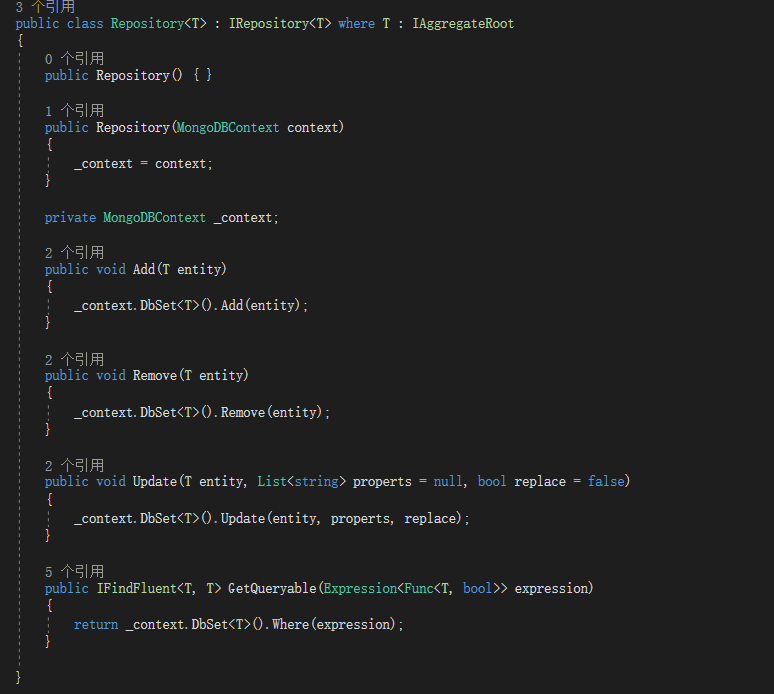

7:建立Service接口

8 领域服务的实现

9:单元测试用例
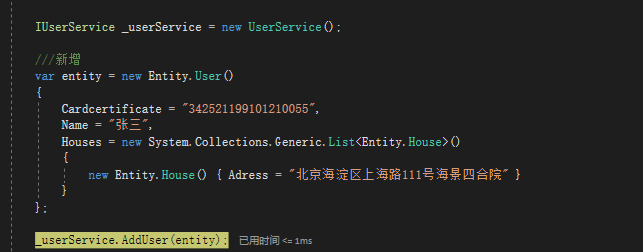
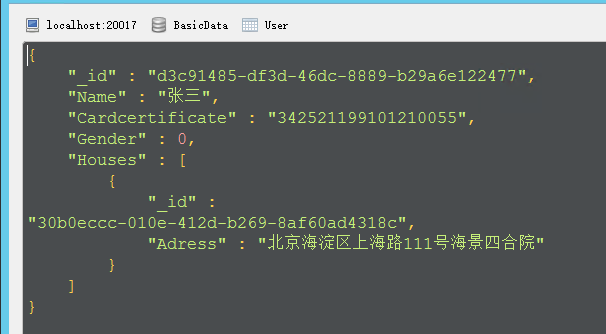
BasicContext Context = new BasicContext(); Context.Users.Add(new Entity.User() { Name = "小七子", Cardcertificate = "123456789", Gender = Entity.Gender.Boy, Houses = new System.Collections.Generic.List<Entity.House>() { new Entity.House() { Adress = "中关村110号双拼别墅" } } }); Context.Users.Where(o => o.Cardcertificate == "110").ToList(); Context.Users.Update(new Entity.User() { }); Context.Users.Remove(new Entity.User() { }); Context.Users.Where().Select(o => o.Name).ToList(); Console.ReadKey();